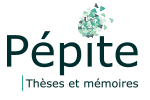Quand l'art agit dans la Cité : vers un nouveau statut du musicien
When art acts in the City : towards to a new musician's status
- Statut social du musicien
- Cité
- Milieu
- Médium
- Vivre-Ensemble
- Neurosciences
- Neuroesthétique
- Musiciens
- Musician's status
- City
- Environment
- Medium
- Comunity life
- Neurisciences
- Neuroesthetic
- Langue : Français
- Discipline : Arts : esthétique, pratique et théorie des arts contemporains
- Identifiant : 2016LIL30052
- Type de thèse : Doctorat
- Date de soutenance : 14/12/2016
Résumé en langue originale
Cette thèse propose une lecture historique du statut du musicien dans la cité – entendue comme une communauté politique organisée autour de la volonté du vivre-ensemble –, selon la conception qu’en avait les anciens Grecs. L’étude de la fonction sociale du musicien depuis la préhistoire a permis de dégager aujourd'hui un nouveau paradigme : celui de médiateur ou de médium, en prise avec un milieu éco-techno-symbolique qu’il contribue à transformer, en rendant visibles les êtres humains qui l’habitent et en particulier les personnes marginalisées, exclues de la société ou en situation de vulnérabilité. L’éclairage probant des neurosciences autour du phénomène musical vient renforcer cette idée que la musique, en tant que langage du corps, peut agir concrètement sur les individus, sans cependant réduire l’humain à des considérations purement neuronales qui expliqueraient la contemplation ou la création de l’œuvre d’art comme le prétend la neuroesthétique.
Résumé traduit
This doctoral thesis put forward an historical reading of the musician’s status in the city. The ancient Greeks had another approach of the city, known as a political community organised around the willingness of « the community life ». The study of the musician’s social status since prehistory has allowed nowadays to shed light on a new paradigm. The musician became a mediator or a medium in conjunction with an economical, technological and symbolic environment, he contributes to a transformation, which makes visible the human beings inside the environment, in particular those marginalised, banned from the society or in situation of vulnerability. The neurosciences highlight this matter by strengthening this phenomenon. Indeed, the music considered as a body language can genuinely operate on people without reducing the human beings to neuronal attentions which can explain the contemplation or the creation of the art work, as neuroesthetics claim.
- Directeur(s) de thèse : Lassus, Marie-Pierre
- Président de jury : Münch, Marc-Mathieu
- Membre(s) de jury : Lassus, Marie-Pierre - Münch, Marc-Mathieu - Vulbeau, Alain - Samson, Séverine
- Rapporteur(s) : Münch, Marc-Mathieu - Vulbeau, Alain
- Laboratoire : Centre d'études en civilisations, langues et littératures étrangères (Villeneuve-d'Ascq, Nord)
- École doctorale : École doctorale Sciences de l'homme et de la société (Villeneuve d'Ascq, Nord)
AUTEUR
- Salvador, David


